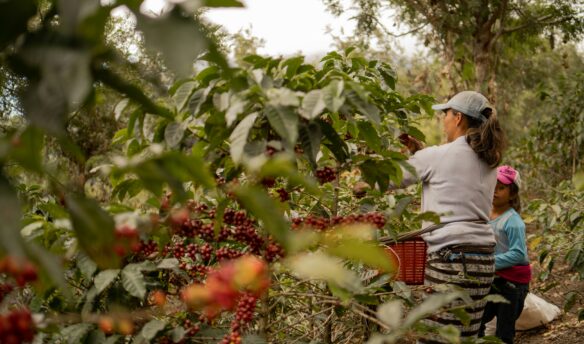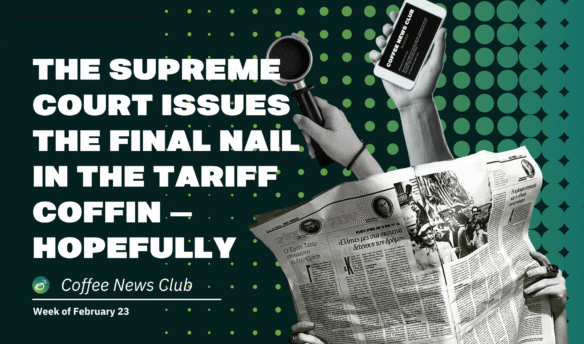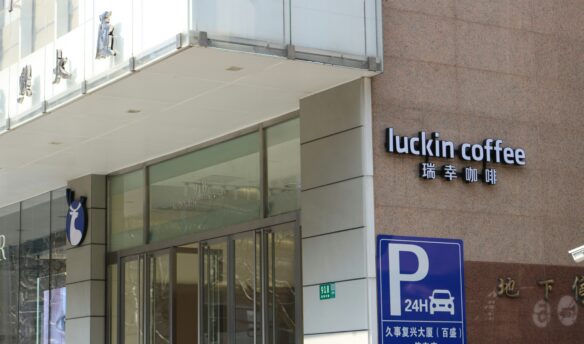It’s a Red Cup Rebellion! Unions strike back at Starbucks while coffee’s commodity price is falling—but news outlets continue to focus on consumers rather than farmers.
‘Coffee Prices are Crashing. What it Means for Your Cup of Joe’ – via CNN
Arabica coffee futures have fallen roughly 35% since August, after a year or so of record highs. This volatility massively impacts coffee producers, as the C price is still the basis upon which almost all coffee is traded. Sudden changes can wreak havoc on long-term planning and farm management, especially because coffee is bought and sold sometimes months or years in advance.
The reasons behind the drop in the C price are complicated: coffee is a global industry built upon a fragile, weather-dependent plant and interconnected with myriad other tendrils of international trade.
For example, a strong dollar can negatively affect the price because “when the dollar goes up, everything measured in dollars, like international coffee prices, tend to go down,” a Rabobank analyst told CNN.
The other major reasons for the falling price are the easing of supply chain issues and the better-than-expected weather in Brazil, which has led to predictions of a bumper coffee harvest next year.
But nevermind all that: how will lower prices affect the cost of my cup of joe??
These sorts of alarmist “price rise” headlines have been ubiquitous for years, as news outlets unsurprisingly frame stories around the consumer. So many of these reports completely ignore the realities of the coffee producers, instead mostly turning to bank analysts and coffee company CEOs for quotes.
And in the end, what it means for your morning coffee is… not much. Consumer coffee prices won’t come down in parallel with the commodity crash because big chains have no reason to lower them, while small companies are still struggling with other burdens such as increased product, shipping, and labor costs.
‘The ‘Red Cup Rebellion’ Is Here as Starbucks Workers Launch Massive Strike’ – via VICE News
On Thursday, thousands of Starbucks workers staged the “Red Cup Rebellion,” a coordinated nationwide strike in response to what Starbucks Workers United called the company’s “union-busting tactics and refusal to bargain.”
Red Cup Day is Starbucks’ busiest of the year, when the company gives out reusable cups to customers who buy one of its holiday-themed drinks. It is very popular.
It’s also awful for workers, with one barista recounting leaving work with bruises from all the running around. That barista described Red Cup Day to VICE as “mentally and physically abusive,” while on the Starbucks Reddit, workers call Red Cup Day “absolutely unbearable” and “the worst day of your year.”
The strike action was launched in response to the breakdown in several collective bargaining sessions last month, with Starbucks refusing to participate, citing objections with union organizers joining bargaining meetings via Zoom.
“You cannot be pro-LGTBQ, pro-BLM, pro-sustainability, and anti-union,” union organizer Michelle Eisen said in a statement. “This Red Cup Day, we’re organizing for a voice on the job and a true seat at the table.”
The strike action comes as the National Labor Relations Board sues in federal court for an injunction prohibiting Starbucks from firing or disciplining employees who engage in union activity across the US. The union claims more than 150 pro-union workers have been fired for organizing, a charge that Starbucks has repeatedly denied.
More News
‘Coffee Science Foundation Announces New Cold Brew Extraction Research’ – via Global Coffee Report
‘AMT Coffee Facing Administration Following Covid-19 Losses’ – via World Coffee Portal
‘Nominations Are Now Open For The 2022 Sprudgie Awards’ – via Sprudge
‘ICO Releases Flagship Annual Report, Urges Youth Participation in Coffee’ – via Daily Coffee News
‘Umeshiso And Cafe Cà Phê Team Up For A HoliGays Party And Vendor Fair’ – via Sprudge
The Week in Coffee Unionizing
As Starbucks workers went on strike in the US, over in the United Kingdom, a leading hospitality union launched a campaign to highlight the issues of pay and staffing at the country’s biggest coffee chains.
Campaigners from Unite, the second largest union in the UK, visited several outlets of Starbucks, Costa Coffee, Caffé Nero, and Pret A Manger to speak with workers and highlight the problems they face in the industry.
“For too long baristas and café workers have suffered from some of the lowest pay and most insecure contracts in the British economy,” Bryan Simpson, Unite’s Lead Organizer for Hospitality, said. “Our campaign aims to change that. By bringing together workers from across the coffee sector’s Big Four, we will develop organizing strategies that seek to drive up standards across the sector.”
Is Coffee Good For You?
Drinking both coffee and tea (but not at the same time, probably) could lower your risk of death, according to a new study from the School of Public Health at Tianjin Medical University, China.
Published in the journal BMC Medicine, the study looked at nearly half a million participants from the medical database UK Biobank and assessed their coffee and tea consumption using a self-reported questionnaire.
After a follow-up period of 15 years, the researchers found that, compared with those who drank neither, those who consumed 1-2 cups of coffee and 2-4 cups of tea per day had a 22% lower mortality risk. Drinking both also lower risks for cardiovascular disease, respiratory disease, and digestive disease mortality.
Discussing possible reasons, the authors hypothesize that coffee and tea’s “overlapping bioactive components,” such as caffeine and chlorogenic acid, could play a role, but further study is needed.
Beyond the Headlines
‘Coffee is a Game of Telephone’ by Ashley Rodriguez
‘The Sprudge Coffee Guide To Duluth, Minnesota’ by Marco Dregni
‘What Does Success in Coffee Look Like?’ by Fionn Pooler
Coffee News Club is written by Fionn Pooler and the Fresh Cup editorial team.








